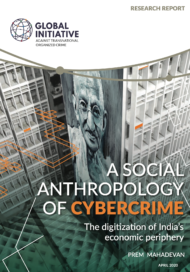Posted on 14 Apr 2020
The Republic of India is a useful case study for tracking the growth of cybercrime in the developing world. Most analyses of such crime focus on advanced, industrialized countries because that is where the largest and most sophisticated offences originate from. But threat factors can also spring from contexts where having a technical degree is only a passport to frustration in low-wage, overpopulated and nepotistic job markets.
While considerable attention has been given to Nigerian-based online scams, the case of India suggests a different growth trajectory to cybercrime. In Nigeria, such crime ‘evolved upwards’ from poorly educated and impoverished sections of the population towards the working class, who were subsequently enticed to join because of lack of legitimate opportunities for generating household income. In India, cybercrime ‘devolved downwards’ from the relatively well off English-literate working class towards poorer (non-English-speaking) sections of society. The country’s initial wave of cybercrime was motivated by greed, not need.




